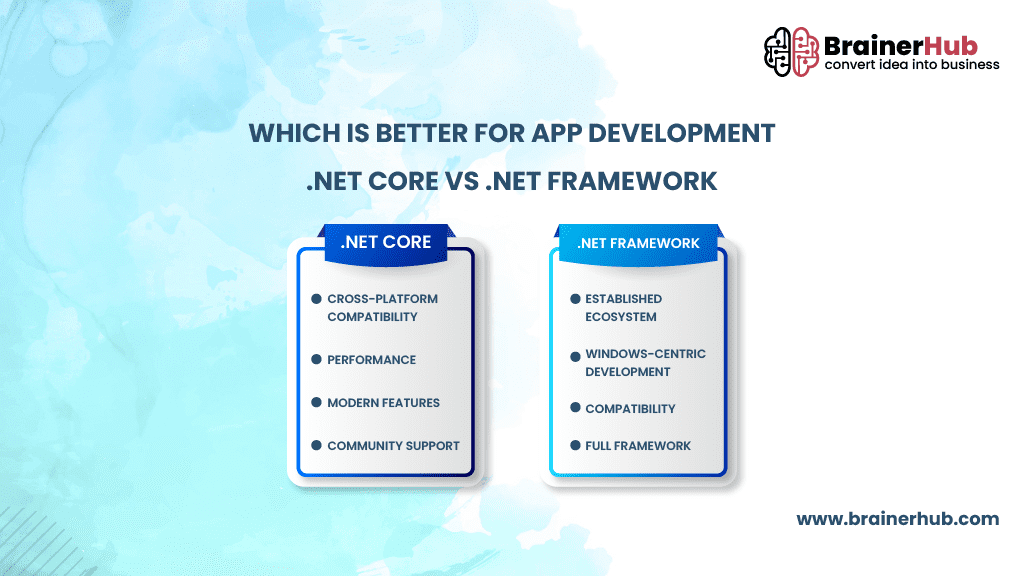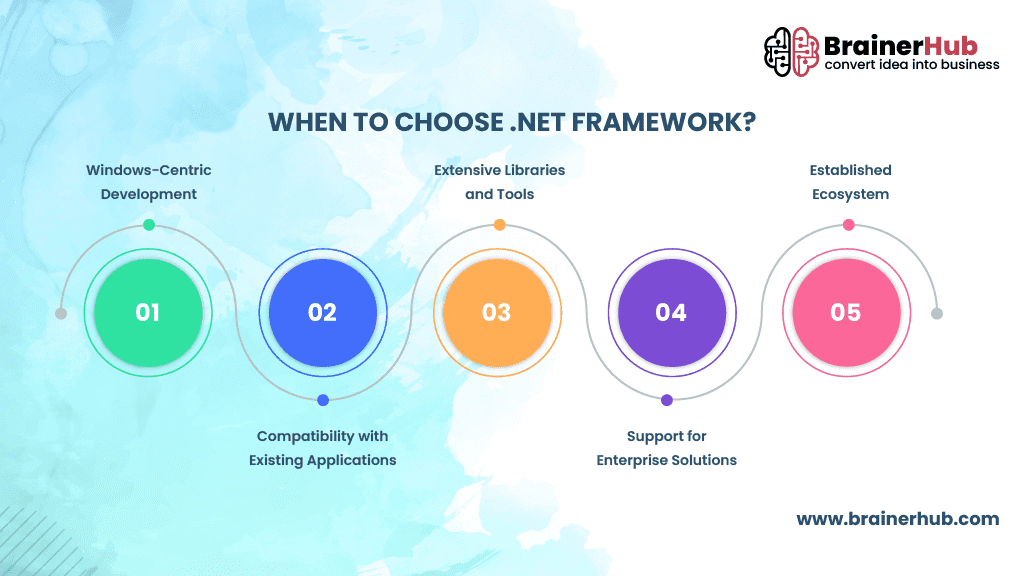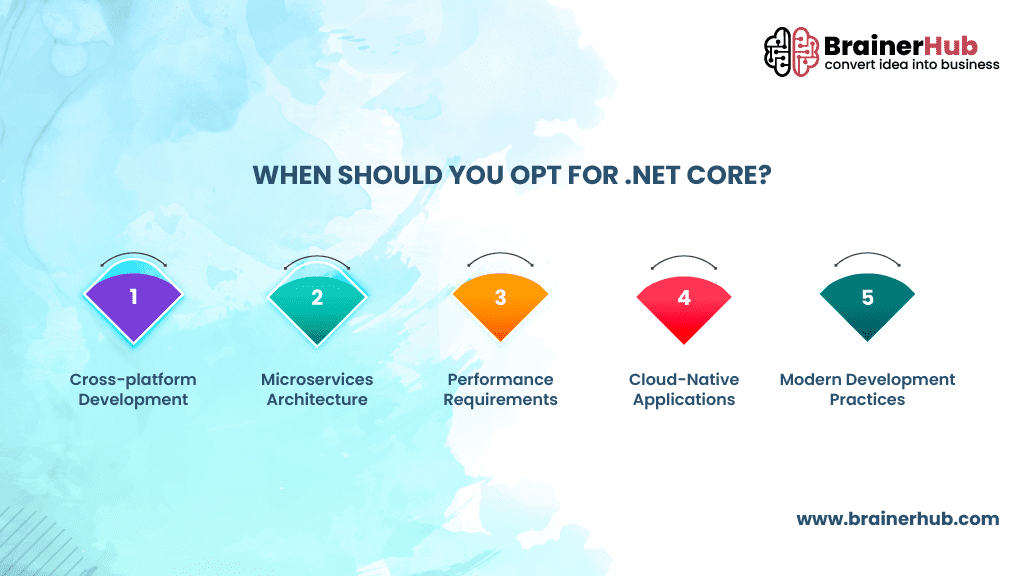In recent years, .NET Core Vs .NET Framework has been a topic of debate among skilled .NET developers. Further, both are part of the .NET ecosystem and have numerous similarities also the visible comparison works for them according to use cases. Developers now have more options depending on the needs of their projects thanks to .NET Core and the ongoing discussion between .NET Core and .NET Framework. Overall, the best option for developing Windows-only applications is .NET Framework, while the greatest option for building cross-platform applications is .NET Core.
How Does .NET Core Work?
To begin with, developers use .NET Core to create contemporary and cross-platform applications. Further, .NET Core will also help with creating advanced desktop and mobile applications. It will also assist with developing game apps, machine learning apps, cloud apps, IoT apps, and microservice apps. With the goal of improving speed and performance, the .NET Core framework was created to address certain shortcomings of the previous iteration and draw lessons from the experiences of the .NET Framework.
It is also more flexible because developers can use contemporary libraries and programming languages with it. Nowadays, businesses rely on .NET Core as it is more convenient and effective option as well as provides better performance, flexibility, and support for the latest technologies.

How Does the .NET Framework Work?
Applications built with the .NET Framework are multi-platform programs that enable developers to build programs that run on Microsoft’s Windows platform. This is an excellent development platform that allows programmers to create games, apps, and services. It offers a wide range of programming languages, libraries, and developer tools to facilitate as well as improve efficiency.
The .NET Framework provides developers with an all-in-one solution to build applications by selecting the right libraries for their tasks; this is especially helpful when developing Windows desktop applications. The .NET Framework provides developers will an all-in-one solution to build applications by selecting the right libraries for their tasks.
Venturing into the .NET landscape? Trust our developers to guide you through!
Comparison Between .NET Core vs .NET Framework
Based on | .NET Core | .NET Framework |
Open Source | .NET Core is an open-source type | .NET Framework has some components that work as open-source. |
Cross-Platform | .NET Core has cross-platform compatibility. | .NET Framework has no cross-platform compatibility. |
Performance and Scalability | .NET Core has high performance and Scalability. | .NET Framework has less scalability and performance ratio compared to Core. |
Application Models | .NET Core can develop web, windows, and mobile apps. | .NET Framework can support desktop, web applications, Windows form, and WPF apps. |
Installation | .NET Core can be installed independently as it is done quickly. | .NET Framework is installed as a single package for Windows. |
Microservices Support | .NET Core supports microservices. | .NET Framework does not support microservices. |
REST Support | For .NET Core, developers have to create REST APIs for implementation. | .NET Framework supports REST APIs |
Packaging and Shipping | .NET Core is available as a collection of Nugget packages. | .NET Framework is packed and shipped together. |
Deployment Model | For .NET Core, it is first updated on a single server, then on other directories and folders. Overall, a better deployment model. | For .NET Framework, it is only deployed on internet information surveys. |
WCF Services | .NET Core provides no support for WCF services. | .NET Framework provides the best possible support for WCF services. |
CLI Tools | .NET Core supports light-weight editors and CLI tools on all platforms. | .NET Framework is too heavy for CLI tools, it can function on lightweight CLI tools. |
Security | .NET Core does not have Code Access Security. | .NET Framework has Code Access Security. |
Compatibility | .NET Core works with different operating systems including Windows, Linux, and macOS. | .NET Framework is available only for Windows operation systems. |

Which is Better for App Development .NET Core vs .NET Framework?
Businesses are often in a dilemma when it comes to choosing the right approach. Hence, professionals conduct in-depth analysis that will help to understand the project requirements and assess which platform will provide benefits as well as optimum results.
When to choose .NET Core? Let’s discuss the criteria right away for better understanding!
- If the project has a requirement of cross-platform connectivity then they need to choose .NET Core.
- If there is a need for microservices, .NET Core can easily fit into the project criteria.
- For projects related to CLI, .NET Core is the perfect choice.
- Want to improve existing applications with high performance and scalability, businesses could simply rely on .NET Core.
When to choose .NET Framework? Let’s delve into the reasons right away!
- If the project requirement needs technologies such as workflow, web forms, and WCF choose the .NET Framework.
- Further, if the applications are to be built with Windows, .NET Framework is the top choice.
- If the project requires extensive libraries and needs to add features or functionality to improve applications.
- It can also assist with upgrades and maintenance for applications to boost overall performance.

To summarize the blog, the decision between .NET Core and .NET Framework ultimately comes down to the particular needs of your project needs. Before making a choice, it’s critical to comprehend the main distinctions between the .NET Core and .NET Framework for balancing the advantages and disadvantages.
The Future of .NET Core vs .NET Framework: Conclusion
To wrap up the debate, this blog provides a clear understanding of .NET Core and .NET Framework. Choosing between .NET Core vs .NET Framework can be difficult at times, as demonstrated by the comparison between two languages. While many companies may find .NET Core to be an effective and efficient option, .NET Framework will be needed for certain application development. In conclusion, it all depends on businesses and their project requirements to choose the approach carefully.
Partner with BrainerHub Solutions for all your .NET Development Services. Get in touch with our team today for .NET Core and .NET Framework requirements!
.NET Core Vs .NET Framework FAQs
Yes, of course. Dot Net developers do use .NET Core and .NET Framework in a single project if required to achieve the targeted goal as well as improve overall efficiency.
No, it cannot be replaced. Both .NET Core and .NET Framework have their set of advantages and disadvantages that work differently for each project. Hence, the approaches co-exist for all .NET development requirements.
To begin with, .NET Core is either restructured or developed from scratch to make it modular, light-weight, faster, and available for cross-platform compatibilities. .NET Framework’s infrastructure requires effective time to deliver necessary project requirements especially when it can only operate for Windows.
.NET Core is definitely leading the way for modern applications and turns out to be more reliable as it facilitates microservices and cross-platform deployment assistance so businesses can launch the applications on different platforms.
Yes, one can use .NET Core for existing .NET Framework applications. To make it successful, it will have to compulsory go through modifications as APIs would differ. If you want to know more, simply connect with our .NET team today!

